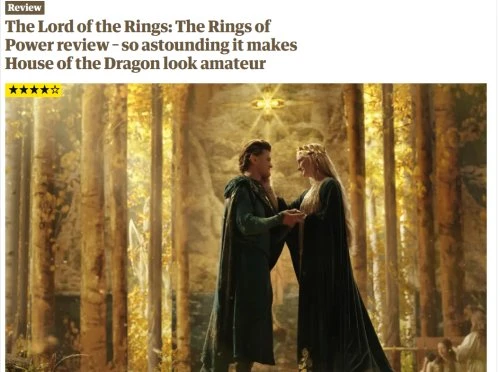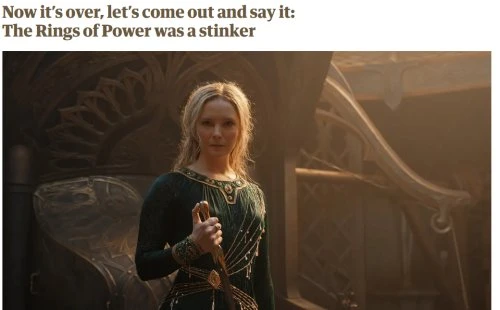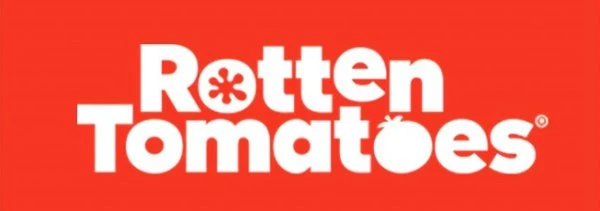
Reviewing the Reviewers
A Personal View
Since this is a website dedicated essentially to the history of television, its reviews differ in purpose from those found in mainstream news media. Reviews here usually aspire to put a show in some sort of context. Depending on the show, that may mean the context of its production history or its commercial relevance or its place in the development of television as a medium or how it reflected - and perhaps changed - what was happening culturally at the time. In addition, a historical drama might be considered in the historical context of its setting, an adaptation in its literary context, a politically themed show in its political context, and so on. A review of a business drama even tried to explain its economic background and one of a science themed drama its basis in theoretical physics.
Reviews in the mainstream news media have a much simpler and clearer objective, to inform readers and viewers if a particular show or film is worth their time.
Such reviews are easy to write. All one really has to include is the genre, a very brief outline of the setting and the plot, the names of any actors or other well known talent whose involvement might attract an audience, and a personal assessment of whether it is any good or not. Almost any reasonably educated person can write one and millions do: the likes of the Internet Movie Database (IMDb) are packed with "amateur" reviews, the best of which are at least as good as, if not better than, the work of "professional" critics. As in many activities, the work of the amateur and the professional has become blurred. Amateurs have always had as strong opinions, many of them as well informed, as the professionals, and now they have more places to express them.

More importantly, the details of how television shows are written and produced are no longer mysteries reserved for a small, self-selecting inner circle. Books, courses, and magazines exposed the whole process even before the internet got into high gear. Industry jargon has entered mainstream discussion. Amateurs can even make their own shows, often of higher quality than supposedly professional output, and post them on YouTube.
The professional critic might therefore be in danger of redundancy, but there are more than ever. This is because time is more valuable than ever, and, with so many forms of entertainment competing for their finite leisure, consumers of "content" need someone to sort through the mass and help to select what is most likely to be worth watching. Reviews also serve a valuable secondary purpose of giving people a brief summary of the shows they choose not to watch, so that they can engage in general cultural conversations. Those who decide not to follow a particular show can, if they want, give informed and articulate reasons for not doing so.
On the supply side, news media outlets know that entertainment news attracts more readers or viewers than all but the most important political or business news. This probably says something depressing about our contemporary culture, but it is worth noting that in Ancient Greece people were flocking to the theatre, and obsessed with talking about what they saw there, even when the Peloponnesian War was raging and destroying their civilisation all around them.
Entertainment reviews are therefore an important element of most news media platforms and serve the specific purpose of keeping the reader or viewer on site. It has always been assumed that those writing the reviews were people of superior knowledge and discrimination, but the closing of the gap between amateur and professional means that is no longer the case - if it ever was.
This assumption of superior taste on the part of professional critics does, however, have a legacy in that it is taken for granted that the opinions of critics are often at variance with those of the vulgar, common herd.
So there is nothing new about the big difference in the ratings given to some shows by professional critics and viewers, most notably on aggregator websites like "Rotten Tomatoes."
What is new is the sort of shows being given different ratings. Where it used to be that snobby professional critics would be more likely to look down on projects intended to appeal to the masses and see it as part of their mission to promote more artistic niche projects, the opposite is now happening: we see professional critics giving very high scores to expensive projects to which viewers give low scores; at the same time, it is often the general public who are initially more likely to give high scores to more innovative projects, with the critics only climbing on board later, giving high scores to second seasons of shows to which they gave mediocre scores in their first seasons.

The most high profile television example of critics giving what is best described as a surprisingly generous rating to a huge corporate investment is Amazon's The Lord of the Rings: the Rings of Power, said to be the most expensive show ever made. While it is not entirely without merit as a production, it is fair to say that its script was not well received by its target audience. Four months after its launch, it currently has a very high "Critic Rating" of 85% but a low "User Rating," i.e. general audience score, of only 38% on the aggregate website "Rotten Tomatoes." There are many other recent examples - at the time of writing a similar splits of 80/33% on She-Hulk Attorney-at-Law and 50/6% on Velma have also attracted a lot of comment - but these are insignificant and destined to be forgotten. The sheer scale of Amazon's investment in The Rings of Power and the status of the Tolkien name make it the focus of the controversy.

The controversy was made worse by Amazon's reaction. They "screened" negative reviews and ratings on their own website and, far more reprehensibly, on IMDb, which they happen to own. Given the lack of transparency, it is impossible to assess the impact of all this, which should be a cause for concern in itself. One cannot help wondering where the authorities that are supposed to regulate monopolies and enforce anti-trust laws are in all this. The point here is that we can no longer rely on audience ratings on either website as an honest and accurate indicator of viewer reaction to this project, which begs the question whether we can rely on them for any other project either.
Amazon's excuse was that they feared politically motivated "ratioing" and "review bombing," which was perhaps a little hypocritical given that they had first stirred the pot themselves by politicising their marketing. There is in fact little evidence that political "ratioing" or "review bombing" are well organised, and in any case one would imagine it would be countered by those to whom Amazon's political marketing was intended to appeal, who have shown themselves quite capable of making their opinions known, especially on "Twitter." In the event, practically every forum that allows free comment has shown an overwhelmingly negative reaction to The Rings of Power based on quality not politics.

This has all been reported very poorly - and generally not mentioned at all - by the mainstream media. Some of the initial reviews of The Rings of Power published by supposedly prestigious outlets like the BBC, The Guardian, and Forbes were positively overflowing with praise, but several of these outlets, including The Guardian and Forbes, later published reviews backtracking on this when confronted with the tidal wave of public criticism.
Of course it could be argued, and is, that anyone's opinion of a show or film or any work is a matter of subjective taste. True enough, but that might explain the odd rogue review, not a definite statistical difference over a large number of different reviews and ratings - or the fact that this happening again and again in respect of shows and films in which a lot of money has been invested.
Moreover, although personal taste is subjective, there are also definite objective standards in film and television production. For example, it is easy to tell the difference between cheap effects and high quality. While scripts are harder to assess, there is a definite body of rules that has built up from Aristotle's Poetics to Robert McKee and Syd Field that a writer breaks at his peril. When one sees a production that seems to ignore these rules completely get high ratings, one has every right to be suspicious.
So it is no surprise that the public are getting suspicious. One now encounters frequent references to "the shill media" and "the access media" in internet discourse.
For those who do not know, in old American street slang a "shill" is a con man's assistant who poses as an honest third party. Is this what is happening? Are professional critics employed by the news media collaborating with the entertainment media to con the public into thinking their products are better than they are?
The answer to that question is not a straight "Yes" or "No."
To dispose of the most extreme version of the conspiracy theory, it is highly unlikely that critics receive direct cash bribes from the entertainment media Industry or - and this is the way it would probably be done if it was - through public relations specialists employed by them. This can be said confidently not on the basis of any naive trust in the honesty of such people but on the reality of their situation. Both journalism and public relations are extremely competitive businesses with lots of eager young people pushing to get in. To be caught in a bribery scandal would kill any news media or public relations career stone dead - even if in the case of public relations it is the getting caught that would be the fatal bit. Given that a single review is no longer as influential as some once were, it would simply not be worth the risk for either party given the small sums that would be paid in an individual case.
However, the most common form of bribery is no longer direct cash payment. One reads of "goodie bags" and free merchandising and generous hospitality offered by the big studios. While it is possible to exaggerate them, there is substance to the stories, and the studios are not spending money on such things out of the kindness of their hearts. Yet neither do the studios really expect recipients of such favours to magic bad reviews into good in return. Their purpose is instead to generate an atmosphere of goodwill that might make a slight difference if the reviewer is on the fence about a project. It might, for example, be a minor consideration in the reviewer's mind that all the free "merch" is valueless is the project is a flop, but surely only a minor consideration. While a reviewer who is constantly hostile might find the corporate gifts drying up, one who gets a reputation for being too fond of "freebies" might not remain a reviewer for long. The wise critic will therefore tread carefully and not sell his integrity cheaply. The wisest of all may refuse everything not essential to their work, especially since the tax authorities are now a lot stricter about such things.

For a working entertainment journalist, there is no avoiding the fact that certain forms of corporate goodwill, especially access, are indeed essential to their work, and most critics come from the ranks of entertainment journalists and may continue to double in that capacity. This, rather than any theoretical bribery, may be the root of a real problem. If it may be unfair to talk in terms of "the shill media," there may be substance to concerns about "the access media."
The relationship between the entertainment Industry and entertainment journalism is necessarily symbiotic. The Industry, like any business, needs to get information out about its products and the journalists need that information to attract readers or viewers. To an extent, the Industry can control the flow of information. It can grant special priority access - advance notice of stories, set visits, interviews with stars, production stills, etc - to journalists it favours. These can be valuable in attracting the readers and viewers journalists and their employers want. Those without such special access must rely on general press releases and "leaks" from the disgruntled. This is a powerful incentive for journalists to "play ball" with the studios.
Ball playing journalists may over time forge mutually advantageous working relationships with studio executives and public relations specialists who work for the Industry. While there remains an element of wariness on both sides, neither will jeopardise those relationships lightly.
There will always be at the back of their minds the knowledge that those relationships may develop further. There has always been a revolving door between Hollywood and entertainment journalism. It is not exactly unknown for journalists to become well paid public relations consultants to the Industry, and vice versa. Peter Bart, the most high profile entertainment journalist of his generation, and the author of several books that are practically required reading for anyone studying Hollywood, was both Editor of Variety and a senior studio executive, a Vice President in charge of production, no less.
It should in fairness be emphasised that the problem of the unhealthily close relationship that can develop between reporters and those on whom they are reporting is by no means unique to entertainment journalism. The existence of a similar revolving door between political journalism and the political class it is meant to be holding to account is a major problem in modern democracy mentioned in my review of Borgen. Similarly the tendency of "embedded" war correspondents to lose their objectivity is discussed in my review of Generation Kill.

In the case of entertainment journalism, it does nothing to encourage objectivity that the very top journalists tend to move in the same broad social circles as established producers and studio executives, even if they are rarely close friends. They tend to have the same social and educational backgrounds, and share the same political and moral opinions. These usually include a strong commitment to diversity but applied only to superficial differences - certainly not to diversity of attitudes and values. This is becoming more apparent as the "Culture Wars" intensify. Both the reporters and the people on whom they report feel an increasing moral and practical obligation to unite and support each other against those they see as common enemies. The general public is beginning to notice this and, whatever an individual's own political views, the knowledge that it is happening is bound to undermine confidence in the integrity of the system as a whole.
In addition to these social pressures on a professional critic to toe the line, there are corporate pressures on the outlets that employ them.
Many news media outlets are owned by media conglomerates that also have interests in entertainment media. In such cases the news divisions are usually very loud in proclaiming their independence from the entertainment divisions - perhaps too loud to be credible.
The reality is that there may indeed be few, if any, memos from the Group CEO dictating editorial policy to the news divisions, but only because such memos would be unnecessary. Anyone who attains executive rank in such an organisation will understand the way the world works: above all else, you do nothing that might embarrass your superiors in the hierarchy.
Amazon's ownership of IMDb is worth mentioning again in this context.
Even where there is no direct ownership, there may be important business relationships between news media and entertainment media organisations. Although these things usually get attributed to Mark Twain, it was in fact the British editor Hannen Swaffer who defined freedom of the press as "such of the proprietor's prejudices to which his advertisers do not object." There is a lot of truth in that. Although individual business models vary, the editor of an online news outlet usually has to maintain a delicate three way balancing act between keeping three separate groups of people happy - the owners or financial investors, the advertisers, and the readers or viewers. Without viewers or readers, he will have no advertisers, and with no advertisers he will have no income. The entertainment media are themselves among the biggest advertisers. They need to advertise, so they are unlikely to cut links with an outlet over a single bad review, but they might make an example of one who looks persistently hostile or who they claim offends their "values," which is usually a cover for something else.
The critics who work for these outlets are well aware of this. Again, there is no need for official memos. They know that their ability to pay their mortgages and give their children a half decent education depends on their keeping their jobs.
So there is no great conspiracy, just a powerful combination of social and economic pressures on the professional critic. He must set his vocational integrity against his need to earn his own living, to provide for his family, and to contribute to the greater community, all of which are moral duties, and moral duties which he might well decide are more important than his obligation to give his complete and uncensored opinion in every single case. This does not mean he is an evil person, but it does mean that neither can he be considered reliable. There is no formal censorship because there is no need for it: self censorship is far more efficient.
Incidentally, just to be clear, please note that this website is privately owned, not for profit, and run for the love of it.
So why does any of this matter? On a point of high principle, citizens of democracies ought to worry when powerful special interests use their privileged positions deliberately to manipulate cultural, and therefore political, development. On a more mundane level, no one wants to be conned or "gaslit," to be told that they are eating cordon bleu when they are really being given warmed up leftovers .
Quite apart from anything else, it is to the benefit of producers as well as consumers to get honest feedback about their products so that they can improve them and make more money.
As has been mentioned in previous essays here, there has been a recent decline both in the commercial performance of most of the big players in the entertainment media Industry and in the quality of their products. There is a reluctance on the part of both the Industry and the journalists who are supposed to be covering it to acknowledge the pretty obvious connection between these two trends.
The big players are investing too much in remakes, "reboots," sequels, and the cynical exploitation of established franchises - reheating leftovers - rather than in original ideas. This strip mining of intellectual property acquired at great expense may be profitable in the short term - sometimes it is not even that - but in the longer term the Law of Diminishing Returns sets in very quickly. Unless they invest in nurturing new talent for the future they will have nothing left to exploit once existing franchises are exhausted.
It is in their own interests for the big players in the Industry to understand this and for their friends in the news media to warn them about it. However, the Industry does not want to listen and the journalists do not want to cause offence. Meanwhile the public are beginning to look elsewhere for their entertainment - to the exciting things happening in non-English speaking markets like India and South Korea, and to some of the genuinely innovative content on free platforms like YouTube.

It might also be in the interests of aggregate websites like "Rotten Tomatoes" to take a long, hard look at the list of people and organisations who contribute to their critics' scores. Some seem to be pretty obscure. Are they all genuine? Say what you like about long established news outlets, often derided as "the legacy media," at least they do have some standards and they tend to employ people who are serious about building a career in journalism. By contrast, many trendy entertainment news websites seem to rely on freelancers who have no interest beyond securing their next commission and who may therefore be a bit too eager to please.
In the end, the Industry, reviewers, and audiences all need each other. The Industry needs to remember that those audiences will disappear if it does not give them what they want, and audiences will ignore reviewers who they believe are being honest. The reviewers also perform a valuable role "speaking truth to power" when they provide useful analyses of why projects fail. Some might not want to hear this, but it is ultimately to the benefit of both the Industry and audiences that they listen.
Good critics can therefore still provide a useful service to both producers and viewers, but only when they maintain their integrity and maintain a safe distance from the Industry.
Published on January 29th, 2023. Written by John Winterson Richards for Television Heaven.

